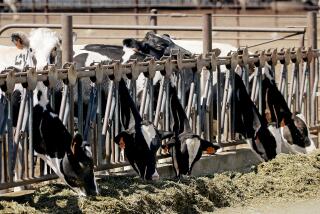Regulators probe alleged milk price manipulation
- Share via
WASHINGTON — Federal commodity regulators are investigating whether the farmer-owned dairy cooperative that controls about a third of the nation’s milk supply engaged in a price manipulation scheme, a spokeswoman for the group said Monday.
Monica Coleman, a spokeswoman for the Dairy Farmers of America, said the Commodity Futures Trading Commission was looking into the group’s trading of cheese futures on the Chicago Mercantile Exchange.
The price of cheese futures can affect milk prices. The Department of Agriculture sets a minimum price of milk that is based in part on a survey of cheese prices that includes futures prices.
Coleman said the investigation, which was reported Monday by the Wall Street Journal, wasn’t new. The farmers group has cooperated with the commission on the matter since 2004, she said. The Journal reported that the commission was preparing to bring charges against the group.
“We do not believe we have violated any laws, and we have and will continue to cooperate,” Rick Smith, president and chief executive of the group, said in a statement.
The price of milk rose 13.5% in the last year, according to the Bureau of Labor Statistics, but Coleman said the “alleged activity is from 2004 and does not affect milk prices today.”
A spokesman for the commission would neither confirm nor deny any investigation.
The Dairy Farmers of America was formed in 1998 through the consolidation of four regional marketing cooperatives. The group markets 61.7 billion pounds of milk for more than 19,000 dairy farmer members.
A report last year by the Government Accountability Office, the investigative arm of Congress, found that cheese trading on the Chicago Mercantile Exchange was susceptible to manipulation because cheese futures were thinly traded.
The Kansas City, Mo.-based dairy cooperative, the nation’s largest, also faces antitrust suits by farmers and retailers for allegedly conspiring to suppress prices it paid for raw milk in the Southeast, while raising prices to the region’s retailers, according to the Journal.
More to Read
Inside the business of entertainment
The Wide Shot brings you news, analysis and insights on everything from streaming wars to production — and what it all means for the future.
You may occasionally receive promotional content from the Los Angeles Times.










